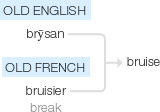Bruise
Old English brȳsan ‘crush or injure with a blow’, reinforced in Middle English by Old French bruisier ‘break’.
wiktionary
From Middle English bruisen, brusen, brosen, brisen, bresen, from a merger two words, both ultimately from Proto-Indo-European *bʰrews-(“to break”):
etymonline
bruise (v.)
Old English brysan "to crush, pound, injure by a blow which discolors the skin," from Proto-Germanic *brusjan, from PIE root *bhreu- "to smash, cut, break up" (source also of Old Irish bronnaim "I wrong, I hurt;" Breton brezel "war," Vulgar Latin *brisare "to break"). Merged by 17c. with Anglo-French bruiser "to break, smash," from Old French bruisier "to break, shatter," perhaps from Gaulish *brus-, from the same PIE root. Of fruits from early 14c. Intransitive sense "become bruised" is by 1912. Related: Bruised; bruising.
bruise (n.)
"contusion without laceration, superficial injury caused by impact," 1540s, from bruise (v.).
